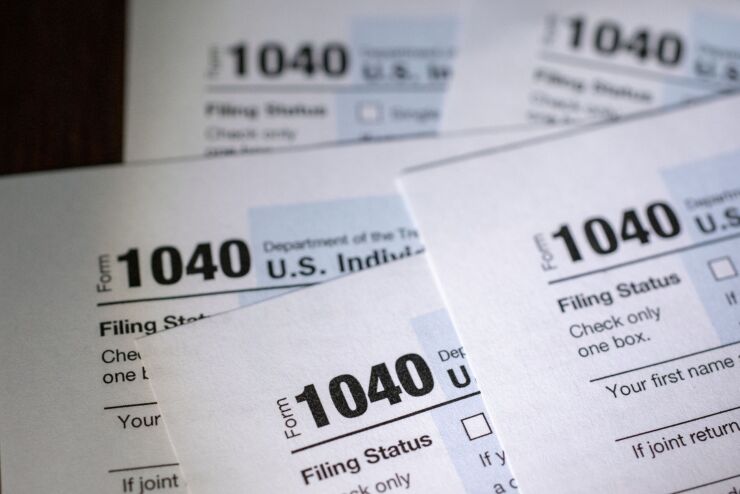Want unlimited access to top ideas and insights?
Cryptocurrency investors face two big headaches this tax filing season: the Internal Revenue Service is ramping up scrutiny of digital assets, and some investors owe large tax bills after cashing in last year’s hefty profits on Bitcoin and other blockchain-based coins.
The twin challenges, a counterpoint to Bitcoin’s
Most advisors direct their clients who want to invest in digital currencies to
“This is going to be the first season where we tackle” clients’ crypto taxes, “and on a case-by-case basis,” says Chad Norfolk, a CFP and Senior Financial Advisor at WMS Partners in Towson, Maryland. The firm, he says, helps clients “aggregate the data and get it over to the accountant.” But for some clients, “we might have to triage it with the accountant.”
Navigating a tangle of electronic records
Merely owning crypto is not a taxable event; potential tax bills arise only if an investor sells, trades or spends it. That's where things get woolly for tax purposes.
Digital-asset exchanges don’t typically send investors an annual statement showing the gains or losses needed to calculate a tax bill, in contrast to what traditional brokerages and funds do for stocks and bonds. Some crypto firms and funds send out a 1099-K statement, with a copy to the IRS, but that only shows gross proceeds. And the forms go only to investors who have undertaken more than 200 transactions with at least $20,000 in gross proceeds.
Some firms don’t even send out that statement. Exchange
The upshot is that many investors have to sift through their electronic records to manually

Even the pros find the taxes daunting. “It’s complicated,” admits billionaire investor Michael Novogratz, the founder, chief executive officer and chairman of Galaxy Digital Holdings Ltd., a financial firm focused on digital assets and blockchain, with
The IRS’s big question this year
The IRS treats Bitcoin, Ethereum and other digital currencies not as money but as property, taxing it like stocks or real estate. Investors owe capital gains rates — for short-term assets held less than a year, that’s the ordinary individual rate, now topping out at 37%; for long term held at least a year, a top 20%.
Crypto investors
It’s a yes-or-no question, and taxpayers tick or leave blank the appropriate box under penalty of perjury when they sign and file their returns. Preparers handling returns for filers who make a mistake on that question or

The fess-up question was buried in the last tax season’s 1040. This year, it’s smack dab on top of the first page, right below the lines for a filer’s name, address, social security number and filing status.
Taxpayers who simply own crypto, or transferred some last year between their digital “wallets” — software that stores an investor’s crypto — can tick “no.” But answering the question gets
The
“The advice to clients is, if you’re going to be dabbling or trading, you need to track these things, keep accurate records, spreadsheets,” says Douglas Boneparth, a CFP and President of Bone Fide Wealth, an advisory firm in New York that caters to millennials. “Even if an accountant is going to help, the onus is on the client to produce that data set.”
Coming after crypto holders
The IRS doesn’t have a lot of information about crypto owners. Online venues that let people trade with each other directly, known as decentralized exchanges, as well as foreign exchanges and digital wallets almost never report an investor’s activity to the IRS. “If you jumped on the bandwagon and started buying and selling things, there are plenty of people who have no idea come tax time what to do,” Boneparth says.
Lewis Taub, the Director of Tax Services at accounting firm Berkowitz, Pollack & Brant in Miami, Florida, sees a parallel with the agency’s
Boneparth, who is a “brand ambassador” for digital currencies for the
Recordkeeping pain
Crypto tax software firms can ease the record-keeping pain. But only a fraction of investors appear to use them. Cointracker says it has

The real problem with manually tracking things comes when an investor moves digital assets between accounts and then sells, according to ZenLedger’s founder and chief executive officer, Pat Larsen. “The cost basis is lost,” he says. So any statements from an individual provider “won’t know about your previous transactions. You may have numbers that are wildly off” for tax purposes.
All this makes for an often-bewildering layer of involvement for financial advisors.
“With crypto, it’s really a self-directed account by the client,” says Norfolk. “They provide the statements to the accountant. If the accountant wants a second pair of eyes, we come in.”





